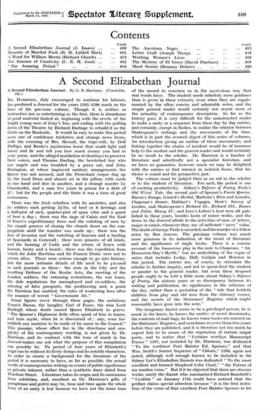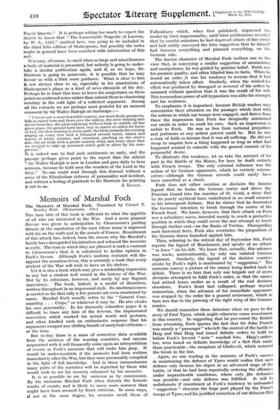A Second Elizabethan Journal
A Second Elizabethan Journal. By G. B. Harrison. - (Constable. 248.) Du. HARRISON, duly encouraged to continue his labours, has produced a Journal for the years 1595-1598 much on the lines ' of his previous volume. Though it is neither so instructive.aor so entertaining as the first, there is abundance of good material hinted at, beginning with the revels of the bright young men of Gray's Inn, and ending with the pulling down of the Theatre by Richard Burbage to rebuild it as the Globe on the Bankside. It would be easy to make this period seem one of confidence tricksters and strange news items, with the cozening of Mrs. Mescall, the tripe-wife, by Doll Phillips, and Banks's mysterious horse that could fight and dance and lie and tell you how much money you had in your purse, and the alleged mutilation of choirboys to preserve their voices, and Thomas Darling, the bewitched boy who saw angels and was troubled by a green cat, and John Harington, at whose improved sanitary arrangements the Queen was not amused, and the Protestant corpse dug up by the local Dean and almost set in the pillory with cards in one hand and dice in another, and a strange murder .by Chamberfot, and a man five years in prison for a debt of 17 ; but for the people and the State it was a time of great seriousness.
There was the Irish rebellion with its anxieties, and also its soldiers each getting 2i lbs. of beef or 8 herrings and a half-pint of sack, quarter-pint of apua vitae and a quart of beer a day ; there was the siege of Calais and the Earl of Essex's expeditionary force and the enlisting of men by the simple process of closing the church doors on the con- gregation until the number was made up ; there was the fear of invasion and the watching of beacons and a landing of Spaniards in Cornwall ; there were piracies of all kinds, and the burning of Cadiz and the return of Essex with honour, booty and a beard ; there was the expedition from which Sir John Hawkins and Sir Francis Drake were not to return alive. These were serious enough to go into history, but the more intimate details of life need to be pursued in such journals as these : the riots in the City and the resulting Defence of the Realm Acts; the meeting of the London soldiers, the rationing restrictions, the war loans, the dole regulations for unemployed and ex-soldiers, the uttering of false passports, the profiteering and, a point Dr. Harrison has omitted, the rules of weakening beer after the manner of recent " Government Ale."
Great figures move through these pages, the ambitious Francis Bacon, the haughty Earl of Essex, the wise Lord Burleigh whose death caused Queen Elizabeth to grieve.
• The Queene's Highnesse doth often speak of him in teares, and turn asyde, when he is discoursed of ; nay, even for- biddeth any mention to be made of his name in.the Council." This passage, whose effect lies in the directness and sim- plicity of the contemporary wording, is not given by Dr. Harrison, and its contrast with the tone of much in the Journal thakes one ask what the purpose of this compilation can possibly be. Nri period of four years of Elizabeth's reign can be without its lively doings and its notable characters. In order to create a background for the literature of the period it is necessary to have, as far as possible, the actual words of contemporaries writing on events of public significance or private interest, rather than a synthetic diary dated from Wardour Street. Literature takes its origin and its sustenance from subtleties, and, excellent as Dr: Harrison's gifts of paraphiase.and précis may be, time.and -time again the whole force of an entry is lost because we have not the inner tune of the record- to convince us in the mysterious way that real words have. The student needs infinitely more guidance than is given in these extracts, even when they are supple- mented by the often concise and admirable notes, and the simple general reader would certainly not resent more of the actuality of contemporary description. So far as the history goes, it is very difficult for the uninstructed reader to make a unity or a sequence from these day by day entries, and certainly, except in flashes, to realize the relation between Shakespeare's writings and the movements of the time, which is in part the avowed object of this series of volumes. An introduction giving an outline of these movements, and linking together the chains of incident would be of immense help to the student and the general reader and would Certainly be no insult to the scholar. Dr. Harrison is a teacher of literature and admittedly not a specialist historian, and we have no guarantee, however much, we may be delighted with the entries . or find interest in, isolated items, that his choice is sound and his perspective just.
The volume must be judged then as an aid to the scholar or to the student of literature. For such, the period is one of exciting productivity. Sidney's Defence of Poetry, Peele's Old Wives' Tale, the second part of Spenser's Faerie Queene, Bacon's Essays, Gerard's Herbal, Marlowe's Hero and Leander, Chapman's Homer, Hakluyt's Voyages, Stow's Survey of London, and Shakespeare's Richard II., Richard III., Romeo and Juliet, Henry IV. and Love's Labour's Lost were all pub- lished in these years, besides hosts of minor works, and the items in the Journal allude to the activities of men of letters, major or minor, whenever they are of sufficient " news " value, The death of George Peele is recorded, and the murder of a fellow actor by Ben Jonson. The previous volume was much more generous in its indication of the trend of literature and the significance of single books. There is a concise account of the humorous play in the note to Chapman, "An Humorous Day's Myrth," but no underlining of the vogue of satire that includes Lodge, Hall, Guilpin and Moreton in this period. The entries are, of course, to stimulate the scholar to further inquiry, and not to spoon-feed the student or pander to the general reader, but even these despised people ought to be told a little more about Sidney's Defence of Poetry, the sixteen years or so discrepancy between its writing and publication, its significance in the Criticism of the day, rather than a quotation of the " tale that holdeth children from play and old men from the chimney corner, and the secrets of the Stationers' Register which might reasonably have gone into the note."
The imaginary diarist seems to be a privileged person, he is much in the know, he knows the matter of secret documents, the contents of mail bags, he knows when books are entered on the Stationers' Register, and sometimes reviews them two years before they are published, and it is therefore not too much to expect him to be aware of the reputation of certain major poets, and to notice that " Certain worthye Manuscript Poems " 1597, not included by Dr. Harrison, was dedicated " To the worthiest Poet Maister Ed. Spenser," and that Wm. Smith's Sonnet Sequence of " Chloris," 1596, again not 'noted, although well enough known to be included in Sir Sidney Lee's Elizabethan Sonnets was dedicated " To the most .excellent and learned Shepherd Colin Clout," " the Patron of my maiden verse." But if it be objected that there are obscure works, surely the diarist who summarised Richard Banefield's "Cynthia" on January 17th could have noticed that the - preface claims special attention because it is the first imita- tion of the verse of that excellent Poet Maister Spenser in his
Fayrie Queene." It is perhaps asking too much to expect the diarist to know that " The Lamentable Tragedie of Lucrece, by W. S., 1595," omitted here, was going to be included in the third folio edition of Shakespeare, but possibly the notes might in general have been enriched with information of this sort.
It is easy, of course, to cavil when so large and miscellaneous a body of material is presented, but nobody is going to under- take a similar publication again, and if, as we hope, Dr. Harrison is going to persevere, it is possible that he may favour us with a little more guidance. What is clear to him is not always clear to us, especially in his annotations of Shakespeare's plays as a kind of news chronicle of the day. Perhaps he is wiser this time to leave his conjectures on these points as scattered notes rather than submit them to chastening scrutiny in the cold light of a collected argument. Among all the extracts we are perhaps most grateful for an unusual comment by Sir Walter Raleigh on landscape :-
" I never saw a more beautiful country, nor more lively prospects, hills so raised here and there over the valleys, the river winding into divers branches, the plain adjoining without bush or stubble, all fair green grass, the ground hard sand, easy to march on either for horse or foot, the doer crossing in every path, the birds towards the evening singing on every tree with a thousand several tunes, cranes and herons of white, crimson, and carnation, perching on the river's side, the air fresh with a gentle easterly wind, and every stone that we stooped to take up promised either gold or silver by his com- plexion."
it is indeed rare to find such sentiments so early, and the passage perhaps gives point to the report that the atheist " Sir Walter Raleigh is now- in London and goes daily to hear sermons, because he hath seen the wonders of the Lord in the deep." No one could read through this Journal without a sense of the Elizabethan richness of personality and incident, and without a feeling of gratitude to Dr. Harrison for pointing
























































 Previous page
Previous page